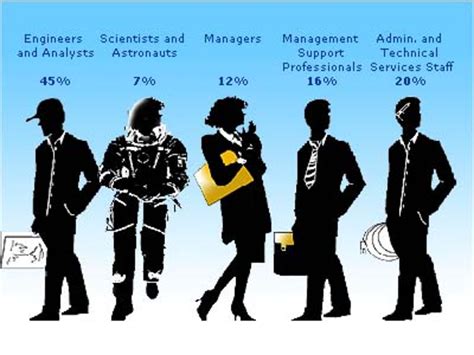Careers Involving Space

Space exploration and the vast universe beyond our planet have captivated human imagination for centuries. With the rapid advancements in technology and a renewed focus on space missions, the field of space exploration has evolved into a thriving industry, offering a multitude of exciting career opportunities. From scientists and engineers to astronauts and space mission support staff, the careers involving space are diverse and fascinating. Let's delve into the world of space careers and explore the paths one can take to contribute to humanity's journey into the cosmos.
The Universe of Space Careers

The space industry is an intricate web of specialized roles, each playing a crucial part in the successful exploration and utilization of space. Here’s an in-depth look at some of the most prominent careers involving space:
1. Astronauts: The Explorers of the Final Frontier
Perhaps the most iconic and recognizable career in space, astronauts are the brave men and women who venture beyond Earth’s atmosphere to explore, conduct experiments, and push the boundaries of human knowledge. Becoming an astronaut is a highly competitive and rigorous process, but it is a dream come true for many space enthusiasts. Astronauts undergo extensive training, learning about spacecraft systems, spacewalking techniques, and how to conduct scientific research in microgravity environments.
The qualifications to become an astronaut vary depending on the space agency, but generally, a strong academic background in STEM (Science, Technology, Engineering, and Mathematics) fields is essential. Astronauts must also possess exceptional physical and mental fitness, as they endure extreme conditions during space missions. The International Space Station (ISS) serves as a primary destination for astronauts, where they conduct research, maintain the station, and participate in various experiments.
2. Space Scientists: Unlocking the Secrets of the Universe
Space scientists are the driving force behind our understanding of the universe. They conduct research, develop theories, and analyze data to uncover the mysteries of space. These scientists come from diverse fields such as astrophysics, astronomy, planetary science, and cosmology. They study phenomena like black holes, dark matter, exoplanets, and the origins of the universe.
Space scientists often work in academic institutions, research laboratories, or space agencies. They may specialize in a particular area, such as studying the solar system, exoplanet detection, or developing space telescopes. Their work contributes to our understanding of the cosmos and informs the planning and execution of space missions.
3. Space Engineers: Building the Future of Space Exploration
Space engineers are the masterminds behind the design, development, and construction of spacecraft, satellites, and space systems. They play a critical role in ensuring the functionality, safety, and success of space missions. Space engineers come from various disciplines, including aerospace, mechanical, electrical, and software engineering.
These engineers work on projects ranging from designing launch vehicles and space capsules to developing satellite communication systems and robotics for space exploration. They collaborate with scientists, mission planners, and astronauts to ensure that the hardware and software systems meet the rigorous demands of space travel.
4. Space Mission Planners and Managers: Orchestrating Space Adventures
Space mission planners and managers are the architects behind the execution of space missions. They are responsible for developing mission concepts, designing flight trajectories, and coordinating the various aspects of a space mission, from launch to landing. These professionals work closely with scientists, engineers, and astronauts to ensure that the mission objectives are met and that all necessary resources are allocated effectively.
Mission planners consider factors such as orbital mechanics, fuel efficiency, and mission duration when designing a space mission. They also manage the intricate logistics of launching and operating spacecraft, including communication with ground control and coordinating with other space agencies.
5. Space Medicine and Healthcare Professionals: Ensuring Astronaut Wellness
The unique environment of space poses significant challenges to human health. Space medicine and healthcare professionals play a vital role in ensuring the well-being and safety of astronauts during space missions. These professionals specialize in areas such as aerospace medicine, telemedicine, and clinical research.
They work on developing countermeasures for the physiological and psychological effects of space travel, such as bone density loss, cardiovascular changes, and the impact of radiation. Space healthcare professionals also provide medical support during space missions, including monitoring astronaut health, conducting medical procedures, and managing any potential emergencies.
6. Space Policy and Law Experts: Navigating the Legal Frontiers of Space
As space exploration advances, the need for a robust legal and policy framework becomes increasingly important. Space policy and law experts focus on the governance and regulation of space activities, ensuring that space exploration is conducted ethically, responsibly, and in compliance with international laws and treaties.
These professionals work on issues such as space traffic management, satellite communication regulations, and the exploration and utilization of celestial bodies. They also address emerging challenges, such as the potential for space tourism and the commercialization of space resources.
7. Space Communication and Public Outreach Specialists: Sharing the Space Story
Space communication and public outreach specialists play a crucial role in connecting the general public with the wonders of space exploration. They work on creating engaging content, developing educational programs, and communicating the latest space discoveries to inspire and inform the public.
These specialists often collaborate with media organizations, educational institutions, and museums to create immersive experiences, produce documentaries, and develop interactive exhibits. They help bridge the gap between the scientific community and the public, fostering enthusiasm for space exploration and encouraging the next generation of space explorers.
Qualifications and Pathways to Space Careers

The journey to a career in space often begins with a strong foundation in STEM education. A bachelor’s degree in a relevant field is typically the minimum requirement, although many positions require advanced degrees, such as a master’s or Ph.D., especially for research and leadership roles.
Here are some common qualifications and pathways to consider for various space careers:
1. Astronauts
- Education: A bachelor’s degree in a STEM field is the minimum requirement, but many astronauts have advanced degrees in fields like aerospace engineering, physics, or biology. Some space agencies also accept medical degrees.
- Experience: Astronaut candidates often have a background in the military or as test pilots, as these roles provide valuable experience in high-pressure environments.
- Training: Astronauts undergo rigorous physical and mental training, including simulated space missions, survival training, and learning to operate spacecraft systems.
2. Space Scientists
- Education: A bachelor’s degree in physics, astronomy, astrophysics, or a related field is a starting point. Many space scientists hold advanced degrees, such as a master’s or Ph.D., allowing them to specialize in areas like exoplanet research or cosmology.
- Research Experience: Space scientists often begin their careers as research assistants or interns, gaining hands-on experience in laboratories or observatories.
- Publications: Publishing research papers and contributing to scientific journals is crucial for establishing credibility and advancing in the field.
3. Space Engineers
- Education: A bachelor’s degree in aerospace, mechanical, electrical, or software engineering is typically required. Some positions may prefer candidates with advanced degrees or specialized training in space systems engineering.
- Hands-on Experience: Space engineers often gain practical experience through internships or cooperative education programs, working on real-world projects with space agencies or private companies.
- Technical Skills: Proficiency in computer-aided design (CAD) software, programming languages, and engineering analysis tools is essential for designing and developing space systems.
4. Space Mission Planners and Managers
- Education: A bachelor’s degree in aerospace engineering, physics, or a related field is a common starting point. Advanced degrees in space mission planning or project management are advantageous.
- Experience: Mission planners and managers often have a background in space operations, with experience in launch and mission control, or they may have worked as space systems engineers.
- Project Management Skills: Proficiency in project management methodologies, such as PMP (Project Management Professional) certification, is highly valued in this field.
5. Space Medicine and Healthcare Professionals
- Education: A medical degree (MD) or a degree in a related field, such as nursing or biomedical science, is required. Advanced degrees in aerospace medicine or space life sciences are advantageous.
- Specialization: Space medicine professionals often specialize in areas like telemedicine, clinical research, or human factors in space.
- Research Experience: Conducting research in space-related health topics, such as microgravity physiology or radiation biology, can enhance one’s credentials.
6. Space Policy and Law Experts
- Education: A law degree (JD) or a degree in international relations, political science, or a related field is essential. Advanced degrees, such as an LLM (Master of Laws) or a Ph.D., can provide further specialization in space law or policy.
- Experience: Space policy and law experts often have a background in international law, government relations, or policy analysis.
- Research and Publications: Conducting research and publishing articles on space law and policy topics is crucial for establishing expertise in this field.
7. Space Communication and Public Outreach Specialists
- Education: A bachelor’s degree in communication, journalism, public relations, or a related field is common. Advanced degrees in science communication or space studies can be advantageous.
- Experience: Experience in media production, content creation, or science education is highly valued. Working with space agencies or scientific institutions can provide relevant experience.
- Communication Skills: Excellent writing, speaking, and multimedia production skills are essential for effectively communicating complex space concepts to diverse audiences.
The Future of Space Careers: Opportunities and Challenges
The future of space careers is promising, as space exploration and utilization continue to expand. Here are some key trends and challenges that space professionals may encounter:
1. Space Tourism and Commercialization
The rise of space tourism and the commercialization of space activities present new career opportunities. Private companies are developing spacecraft and space habitats, offering experiences like suborbital flights and lunar missions. This trend opens doors for entrepreneurs, engineers, and scientists to work in a dynamic and rapidly evolving industry.
2. International Collaboration
Space exploration is increasingly a global endeavor, with international partnerships playing a vital role. Space professionals must be prepared to work in multicultural teams and collaborate with counterparts from around the world. This trend fosters a diverse and inclusive space community.
3. Advanced Technologies
The rapid advancement of technologies like artificial intelligence, robotics, and nanotechnology is revolutionizing space exploration. Space professionals must stay abreast of these innovations to leverage them effectively in their work.
4. Ethical and Legal Considerations
As space exploration expands, ethical and legal considerations become more complex. Space professionals must navigate issues such as space resource utilization, environmental impact, and the responsible conduct of space activities. This requires a deep understanding of the legal and ethical frameworks governing space exploration.
5. Public Engagement and Outreach
Engaging the public and fostering enthusiasm for space exploration is crucial for the long-term sustainability of the space industry. Space professionals play a vital role in communicating the importance and impact of space missions, inspiring the next generation of space explorers, and securing public support for space programs.
Conclusion
Careers involving space offer a unique and rewarding path for those with a passion for exploration and a drive to push the boundaries of human knowledge. From astronauts to space scientists, engineers, and policy experts, the space industry provides a diverse range of opportunities for individuals with the right skills and dedication. As we continue to explore the cosmos, the need for talented and passionate professionals will only grow, making space careers an exciting and promising choice for those seeking to make a meaningful impact on humanity’s journey into the universe.
How can I prepare for a career in space exploration if I’m still in high school or early in my academic journey?
+Starting early is an excellent idea! Focus on building a strong foundation in STEM subjects and consider joining science clubs or participating in robotics competitions. Stay updated on space-related news and developments, and seek out opportunities to learn about space careers through internships, workshops, or online courses. Networking with professionals in the space industry can also provide valuable insights and guidance.
What are some of the most exciting space missions or projects happening right now that space professionals are working on?
+There are numerous exciting space missions and projects currently underway. For example, NASA’s Artemis program aims to return humans to the Moon and establish a sustainable presence there. The European Space Agency’s (ESA) ExoMars mission is exploring Mars for signs of life, while the James Webb Space Telescope is providing unprecedented views of the early universe. These missions offer a glimpse into the incredible work being done by space professionals around the world.
How can I stay updated on the latest advancements and opportunities in the space industry?
+Staying informed is crucial in this rapidly evolving field. Follow reputable space news websites and blogs, subscribe to space-related podcasts, and attend space conferences or webinars. Many space agencies and organizations also have social media accounts where they share updates and announcements. Additionally, joining professional organizations or networking groups can provide valuable connections and access to the latest industry insights.



